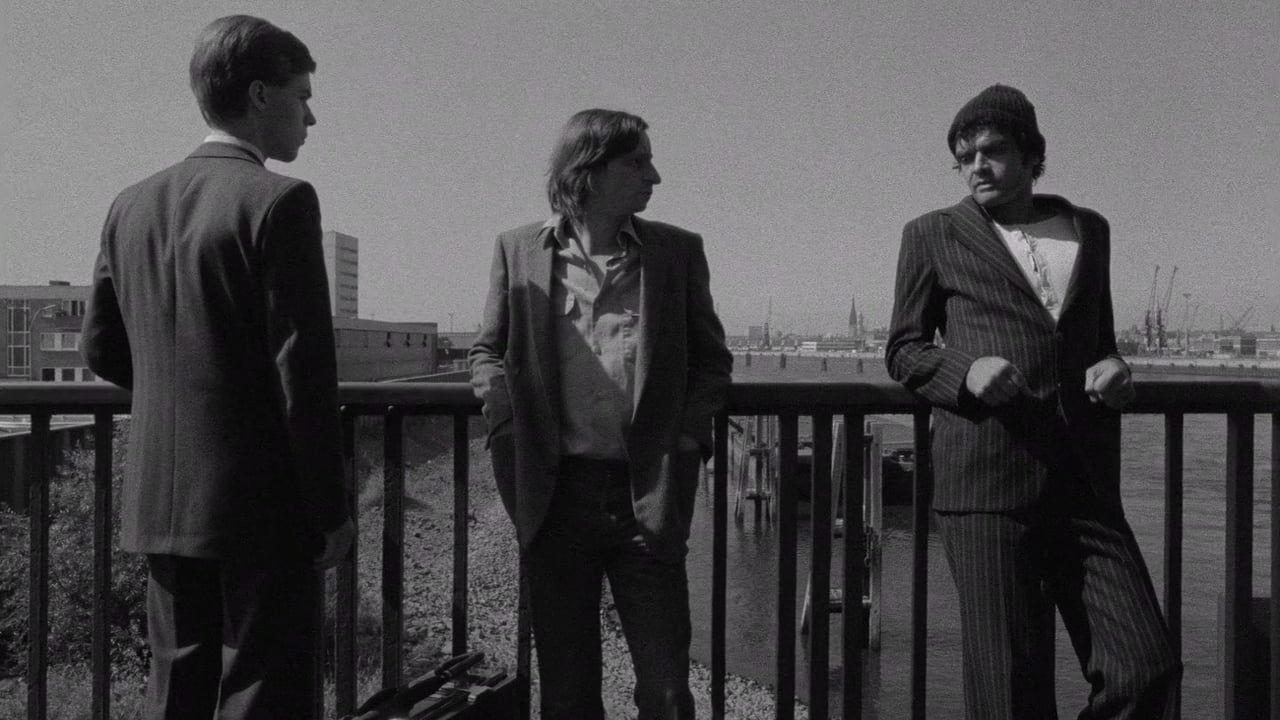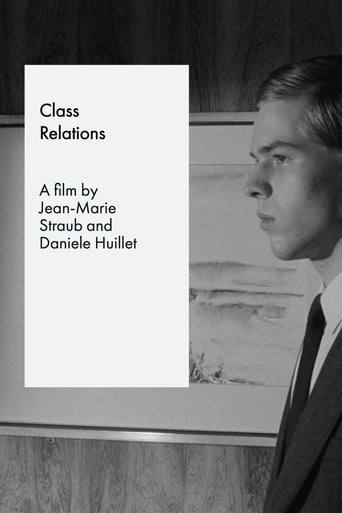Horst in Translation (filmreviews@web.de)
"Klassenverhältnisse" or "Class Relations" is a West German 2-hour film by French filmmakers Huillet and Straub and they are known to make movies in all kinds of languages, such as English, Italian, French or German like this one. It is one of their more known works for sure and the lead actors here are Christian Heinisch and Nazzareno Bianconi, two actors that never appeared in another film again and are this pretty much entirely unknown day in the 21st century. The exact opposite is Mario Adorf, one of the most successful and most prolific Swiss actors ever, who played in Academy Award winning films. This film here is from 1984, so it is over 30 years old already, but by then black-and-white films were definitely a rarity already and here this choice for lack of color was probably a creative decision. But it adds almost nothing I must say.In general, I felt this was a very uninspired work. There is a decent moment here and there like the boy being sad about losing the only picture of his parents, but these moments are hurt by the extremely wooden line delivery by all the actors, especially lead actor Heinisch. I cannot imagine that experienced filmmakers like Huillet and Straub would not have recognized it or cast him, so they are probably the ones to blame as they wanted it that way. The result is a film that feels like a theater play for the most part, but I must say this problem with the dialogues as well as the extremely boring and dragging story made this almost a painful watch. And even beyond the talking, with focus on the body language, the acting isn't really any better. There is no denying that Huillet and Straub are not easy to find an access to as an audience member, but if you start with this film here from their body of work, you will probably have zero interest in checking out another work from the duo. I was genuinely bored here and I could not wait for the film to end. Highly not recommended.
Lucas Sousa
A friend of mine told me two very important things: first, that both the shape and the content are important, and that the content might be even more important than the shape. Second, that when we read or watch a story, we must be able to analyze what we see and question what we are reading or seeing, we must not just see it for pleasure, we must see and try to ask questions about what's the meaning of that and try to understand what is happening. When I watched "Class Relations" I got really uncomfortable when people started leaving the room as the movie continuously got worse on its shape, but what those people might have not paid attention, (or maybe they didn't wanted to make an effort to try to understand what was happening) is that the content of that awful shape is very interesting and important. If you ever had parents, you know what is to have your opinion ignored and your ideas be laughed at, if you are a woman, you might experiment that too sometimes when your gender is minority in a table and you have friends with patriarchal thinking. And if you are just a waitress, a waiter or a "heater", you will be ignored in your claims no matter how based on facts they are. That's what happens with the "heater" at the beginning of the film, he is from a lower class, a labourer, and he is asking for very reasonable things, but the dominating class members, the captain of the ship and Karl's uncle, make his claims seems absurd. Karl thinks that it's because the "heater" could not explain well his intention, but it's not just a matter of performance, it's a matter of position in a determined situation, on that case, it was a matter of a labourer facing his exploiters, the bourgeoisie. That's why the name of the movie is "Class Relations". You, the reader of this text, might not agree with me at first, but when we compare the relations the young Karl had with others when he was a member of the bourgeoisie with the relations with others when he was just a labourer, you get to know that your position really matters in a discussion about an subjective problem (sometimes even about an objective problem). I'll give you a personal example. When I was a child, I once told my father that a thunder could get five times the temperature of the sun, he yelled at me "where the hell did you heard that?". My father was no ordinary man, he was a very erudite person with years of study and he had a personal library of many important titles of many important authors, but his position in that situation was above mine, he wouldn't listen to what just a child would say. I told him that I heard that in a channel that was ranked by BBC on 2014, the second best channel in the world for culture and knowledge, he laughed at me saying that such channel wouldn't say such stupidness, and that if a thunder could get five times the temperature of the sun the entire Earth would be reduced to ashes. At that time, I didn't have the knowledge to explain how a thunder could get five the temperature of the Sun without causing the apocalypse, but even if I knew, I would most likely be quiet and unable to explain what I knew, just like the "heater" at the beginning of the film and the young Karl at the end of the film. William Footwhite in his "Cornerville" shows how a position of a person in a determined social group could affect his "power to convince" or the "power to be supported by the majority when taking a decision in group", something similar happens in a macro level, between classes, and that is the very important content the movie tries to show us. It's not easy to get to this comprehension, you might need some sociological knowledge before that, but when you get it, even the shape of the film being awful (bad interpretation, bad plot, bad photography, bad filming, etc.), it will be worth to watch it if you like movies with a good content. But I believe all these "problems" are intentional, the absence of drama made by music, which is so common in western mainstream movies, make clear the purpose of this film, but this is another story to speak about...
robert burton
Only a handful of directors have attempted to adapt Kafka to the screen:Welles with "The Trial" and Haneke with "The Castle" being the two most successful,but this adaptation of his unfinished novel "Amerika" is perhaps the best. "Amerika" was always Kafka's most approachable novel without many of the labyrinthine plots and tortured characters of the other novels and the Straubs certainly approach it with the utmost fidelity. It is the story of Karl Rosmann,a German youth who after getting a servant-girl into trouble is sent by his parents to find work in America.Like the novel,the film proceeds with a series of picaresque episodes recounting his travails first in staying with his wealthy uncle and then finding employment in a large opulent hotel. The Straubs' minimalist style of long takes combined with static camera-work is preserved but the habitually expressionless acting style of their usually non professional cast is here combined with a more declamatory,theatrical style of acting favoured by some of the more experienced members of the cast,notably Laura Betti,and unlike many of their more hermetic film,this can be enjoyed by audiences as a much more straightforward exercise in the pleasures of narrative film-making.
zoe-66
This is one of the great films of the 20th century. It is extraordinary and inspiring. It is simple, clear and to the point - it is also transcendent.The film is based on Kafka's unfinished novel "Amerika". It was shot in Europe which is appropriate since Kafka never visited America and the novel is not about the real United States but it is rather a kind of allegory. Straub and Huillet's version is indeed about class relations and about the society that is created by capitalism, which is utterly cruel, capricious and ludicrous.One interesting aspect is that it appears to take place at no specific time in history. It is neither exactly in the present or the past. Rather the characters wear the costumes that best express their position in society, whether it is a nouveau riche industrialist in a large vulgar 1970's bow tie or a policeman in the uniform of the Keystone Kops .The film is photographed beautifully and simply in black and white. The framing and relationship between shots tells you everything about the relationship between the characters. For example there are long passages of shot/reverse shot with no resolution or establishing shot. It shows us how disconnected the protagonist, Karl Rossman is from the world around him.There are some interesting actors in the film, note for example Laura Betti who was in many Pasolini films. Also the director Harun Faroki plays one of the characters.I only wish more of Straub/Huillet's work was available in the USA.

